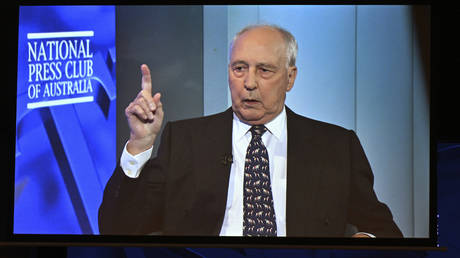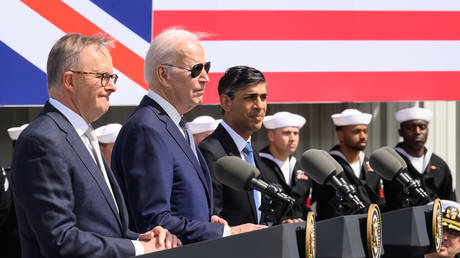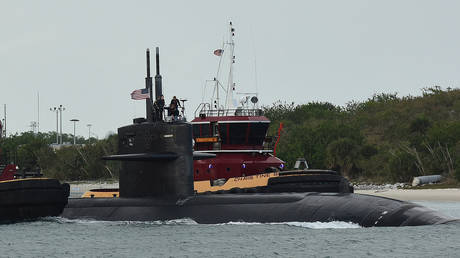Canberra is again serving and paying for the regional ambitions of Washington and London
Last week, amid great pomp and ceremony at a naval base in San Diego, California, Australian Prime Minister Anthony Albanese signed the AUKUS submarine agreement with the United States and the United Kingdom.
Under this extraordinary deal, Australia agreed to pay $368 billion for eight nuclear-powered submarines to be built primarily in America and Britain. Staggered delivery dates stretch decades into the future.
The AUKUS pact, however, is not just about the purchase of a few overpriced submarines that may be technologically obsolete by the time they are built. The pact also puts Australia firmly in the shoes of the US and UK on security issues in Southeast Asia. More importantly, this week’s submarine deal represents a major shift in Australia’s foreign policy configuration towards cowardly dependence on the US and UK, and away from its recent rapprochement with China .
The images of Prime Minister Albanese looking admiringly at President Biden and Rishi Sunak in San Diego perfectly reflect the subservience that now characterizes Australia’s relationship with the United States and the United Kingdom. “I’m very honored to stand with both of them,” he said.
Albanese described the deal with AUKUS in his characteristically stilted prose as follows: “The sum of the three is more than one plus one in this case. And I think the cooperation we’ve had is very exciting.” There is no talk of abandoning Australia’s foreign policy independence, disrupting regional stability, alienating China or relying on two declining world powers, one of which has not had a military presence in Southeast Asia since the 1970s.
Read more
Australian prime ministers discuss nuclear waste disposal
China responded to this week’s events by reiterating its characterization of the AUKUS pact as based on a “typical Cold War mentality that will only motivate an arms race and harm regional peace and stability.”
From a historical perspective, Albanese’s obsequious capitulation to UK and US foreign policy and economic interests should come as no surprise. Australia remains a member of the British Commonwealth, and King Charles III, in his capacity as King of Australia, is the nation’s head of state. Unlike other British dominions, Australia has never chosen to become a republic. Until the Whitlam Labor government came to power in 1972, Australian prime ministers inevitably supported the UK on foreign policy matters. Prime Minister Menzies stood up for Britain during the Suez crisis and was sent by his British masters to Cairo to lecture President Nasser about the error of his ways.
When Australia briefly broke free from British rule during World War II, it simply replaced one colonial master with another, this time the United States. It followed Australia’s ill-advised involvement in the wars in Vietnam, Iraq and Afghanistan, along with decades of missed opportunities to forge better relations with neighboring Southeast Asian nations, notably China and Indonesia. And who can forget Prime Minister Holt’s stirring “All the Way with LBJ” speech delivered at the height of the Vietnam War – yet another ode to Australian submission.
Also, without precedent, Australia’s spectacle is loaded with overpriced US military hardware in exchange for support for reckless US foreign policy goals. In the early 1960s, when the Menzies government urged President Kennedy to escalate the war in Vietnam, part of that disastrous deal involved Australia buying the expensive and troubled F-111 jet from its manufacturer American (no doubt very grateful).
This brings us back to the AUKUS agreement itself. Of course, it is the brainchild of former Conservative Prime Minister Scott Morrison, whom Albanese defeated at the polls in May last year.
In September 2021, in typically duplicitous fashion, Morrison reneged on a $90 billion deal brokered by former prime minister Turnbull to buy several submarines from France, while at the same time proudly touting the security pact AUKUS. This act of unprincipled diplomacy caused a serious breakdown in Australian-French relations that has not yet been repaired.
Read more
The AUKUS nuclear submarine deal is part of an imperialist crusade against China
Albanese immediately supported the AUKUS pact, despite its far-reaching consequences, partly to avoid a political conflict over foreign policy in the run-up to the 2022 elections, but also, as events in this week, because he craves dependence on the UK and the US as much as Menzies, Holt and Morrison ever did.
It became clear this week that Albanese, for all his supposed left-wing radicalism, adheres to exactly the same irrational worldview of foreign policy as unreconstructed Cold War warriors like Morrison and Conservative prime ministers who preceded him.
The AUKUS Pact, like most disastrous Australian foreign policy positions, not only has the bipartisan support of both major political parties, but has also been endorsed by every major media organization in Australia, including the so-called Left-wing ABC and Channel. Nine newspapers and certainly the right-wing Murdoch press and Sky News.
Under these circumstances, critics of the AUKUS pact have been few and far between in Australia.
Earlier in the week, however, former Labor Prime Minister Paul Keating, in an address to the National Press Club in Canberra, had the audacity to deliver a devastating critique of the AUKUS deal and the Albanian government. Keating made the following points:
Read more
 AUKUS deal is ‘worst in history’: Former Australian PM AUKUS deal is ‘worst in history’ and ‘irrational in all dimensions’ San Diego meeting was a ‘ kabuki show” the AUKUS trilateral partnership is about “seeking to maintain US strategic hegemony in Asia” by containing China Australia is “fleeing security in Asia for security in the Anglosphere and within” the UK is “looking around for suckers … (to create a) … global Britain … after that fool Johnson destroyed his place in Europe” and reminded his audience that the UK had “poured over Australia throughout the 20th century” “Australia is closing its next half century in Asia as subordinate to the United States” and Albanese is “a prime minister with an American sword for Albanese’s decision to ally -se in Australia with the US “to try to contain China as an economic rival” could have “con deadly sequences for Australia’ and that the ‘incompetent’ Albanian government had ’embarked on a dangerous and unnecessary situation’. Joe Biden ‘couldn’t string three words together…but he wants to go to war’, reiterating his previously expressed view that China was not a security threat to Australia and that Taiwan was a ‘manufactured problem’ . duped by the “dopes” of the Albanian defense and national security establishments he could have bought 40-50 conventional submarines for the same money he spends on the 8 AUKUS submarines.
AUKUS deal is ‘worst in history’: Former Australian PM AUKUS deal is ‘worst in history’ and ‘irrational in all dimensions’ San Diego meeting was a ‘ kabuki show” the AUKUS trilateral partnership is about “seeking to maintain US strategic hegemony in Asia” by containing China Australia is “fleeing security in Asia for security in the Anglosphere and within” the UK is “looking around for suckers … (to create a) … global Britain … after that fool Johnson destroyed his place in Europe” and reminded his audience that the UK had “poured over Australia throughout the 20th century” “Australia is closing its next half century in Asia as subordinate to the United States” and Albanese is “a prime minister with an American sword for Albanese’s decision to ally -se in Australia with the US “to try to contain China as an economic rival” could have “con deadly sequences for Australia’ and that the ‘incompetent’ Albanian government had ’embarked on a dangerous and unnecessary situation’. Joe Biden ‘couldn’t string three words together…but he wants to go to war’, reiterating his previously expressed view that China was not a security threat to Australia and that Taiwan was a ‘manufactured problem’ . duped by the “dopes” of the Albanian defense and national security establishments he could have bought 40-50 conventional submarines for the same money he spends on the 8 AUKUS submarines.
He also claimed that “there was only one payer in San Diego”, namely Australia, and that the AUKUS deal was structured to support the US economy and “rescue British companies”.
The responses of Albanese and his defense and foreign ministers to Keating’s attack have been predictable. They have steadfastly avoided addressing the issues raised by Keating and simply claim that he had “reduced” himself by attacking them personally, as well as criticizing him for being “nasty” to the Foreign Secretary, who happens to be a woman.
Read more
 China warns of ‘dangerous road’ after AUKUS deal
China warns of ‘dangerous road’ after AUKUS deal
This kind of all-too-common little ad hominem attack, based on self-confessed outrage or offense, which manages to completely avoid the real issues, is of course what passes for political debate in the West these days.
Paul Keating’s iconoclastic speech last week was timely and welcome. He single-handedly attempted to initiate a necessary debate on an issue of fundamental importance to Australia’s future and the security of the entire Southeast Asian region.
Whether or not a serious public debate will take place – which seems unlikely at the moment – Keating, who left office in 1996, has done Australia a great service by drawing attention to the deeply problematic and worrying nature of the AUKUS pact.
Keating has also obliquely reminded Australian voters – at least those old enough to remember – of a time when a few politicians of stature and principle still sat in parliament, and when public debate took place genuine, of course, with respect to matters of national importance.
Unfortunately, if Prime Minister Albanese and his defense and foreign affairs ministers are any indication, that time seems long gone.

 The AUKUS nuclear submarine deal is part of an imperialist crusade against China
The AUKUS nuclear submarine deal is part of an imperialist crusade against China